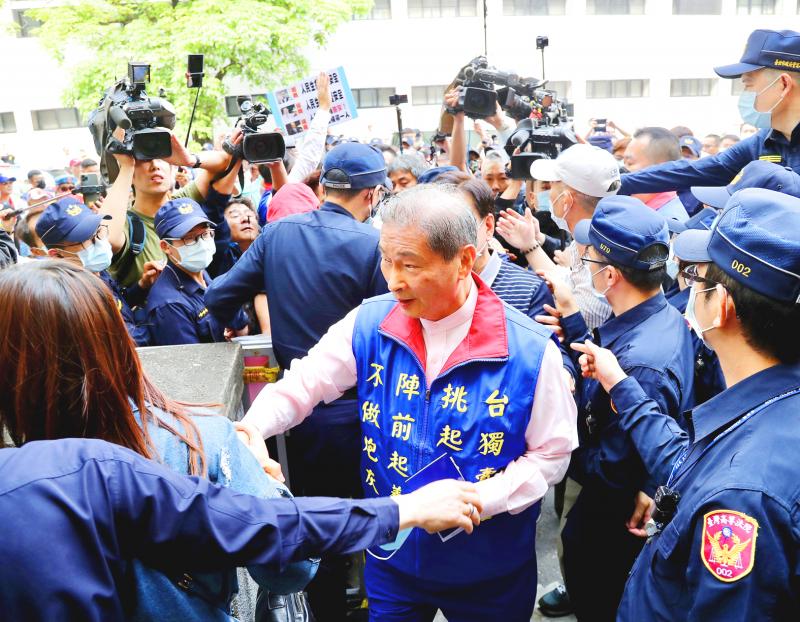The judiciary must enforce the National Security Act (國家安全法) and other applicable laws to end calls by China Unification Promotion Party (CUPP) founder Chang An-le (張安樂) to overthrow the government, Democratic Progressive Party (DPP) lawmakers and legal experts have said.
Chang’s open calls for China to annex Taiwan by military invasion and for Taiwan’s military commanders to surrender to China are unlawful, and he should be prosecuted because he is working as an agent for an enemy state, DPP Legislator Wang Ting-yu (王定宇) said.
“We ask Taiwan’s judicial agencies to look at the recent amendments to the National Security Act and do the right thing … by prosecuting Chang,” he said.

Photo: CNA
Chang attended a political forum organized by the Chinese government, titled “Chinese Compatriots Across the Strait, Joining Hands to Realize the Chinese Dream,” which was held in Shanghai on July 15 and 16.
About 100 people, including Taiwanese academics, youth representatives and political party delegates, as well as Chinese officials in charge of cross-strait affairs, attended the event.
Wang said that in his address, Chang said: “In Taiwan, through our CUPP organization, we will set up a propaganda team to promote unification with China. It will spread seeds for growth, to propagate our political ideology. This is how the communist Red Army won the Chinese Civil War.”
Chang was quoted as saying that he is not afraid of the National Security Act or the Anti-Infiltration Act (反滲透法), “because my country is China. I am on the Chinese Communist Party’s side, so these Taiwanese laws cannot apply to me.”
“I have made the proclamation in Taiwan that China must annex Taiwan,” he was quoted as saying.
Chang also spoke of making friends and networking with retired and active military personnel in Taiwan.
“I have called on them to surrender ... on the day that China starts its military invasion of Taiwan. We will launch a revolt, an armed insurrection against the government here,” Chang said. “The youth groups at many temples in Taiwan with which we have been networking will join us when this day comes.”
DPP lawmakers and legal experts said that Chang’s statements contravene the National Security Act, and if Ministry of Justice officials and prosecutors do their jobs, Chang could be indicted for sedition and related charges, and could be handed a minimum sentence of seven years in prison.
Attorney Huang Di-ying (黃帝穎) said that Chang’s call for armed insurrection amounts to sedition, and while his calls for unification with China fall under freedom of speech, Chang is undertaking “unlawful action” by organizing groups to revolt, and by calling on troops not to exercise their duty to defend Taiwanese and their elected government.
As this has undermined national security and contravened the law, the judiciary should act upon it, Huang said.
“Chang also has a background in organized crime syndicates, and prosecutors could apply provisions under the Organized Crime Prevention Act (組織犯罪防制條例),” Huang said.
“We demand that the judiciary and intelligence agencies investigate Chang’s and the CUPP’s sources of funding, as it is likely they are receiving financial support from an enemy state,” Huang added.

Alain Robert, known as the "French Spider-Man," praised Alex Honnold as exceptionally well-prepared after the US climber completed a free solo ascent of Taipei 101 yesterday. Robert said Honnold's ascent of the 508m-tall skyscraper in just more than one-and-a-half hours without using safety ropes or equipment was a remarkable achievement. "This is my life," he said in an interview conducted in French, adding that he liked the feeling of being "on the edge of danger." The 63-year-old Frenchman climbed Taipei 101 using ropes in December 2004, taking about four hours to reach the top. On a one-to-10 scale of difficulty, Robert said Taipei 101

A preclearance service to facilitate entry for people traveling to select airports in Japan would be available from Thursday next week to Feb. 25 at Taiwan Taoyuan International Airport, Taoyuan International Airport Corp (TIAC) said on Tuesday. The service was first made available to Taiwanese travelers throughout the winter vacation of 2024 and during the Lunar New Year holiday. In addition to flights to the Japanese cities of Hakodate, Asahikawa, Akita, Sendai, Niigata, Okayama, Takamatsu, Kumamoto and Kagoshima, the service would be available to travelers to Kobe and Oita. The service can be accessed by passengers of 15 flight routes operated by

Taiwanese and US defense groups are collaborating to introduce deployable, semi-autonomous manufacturing systems for drones and components in a boost to the nation’s supply chain resilience. Taiwan’s G-Tech Optroelectronics Corp subsidiary GTOC and the US’ Aerkomm Inc on Friday announced an agreement with fellow US-based Firestorm Lab to adopt the latter’s xCell, a technology featuring 3D printers fitted in 6.1m container units. The systems enable aerial platforms and parts to be produced in high volumes from dispersed nodes capable of rapid redeployment, to minimize the risk of enemy strikes and to meet field requirements, they said. Firestorm chief technology officer Ian Muceus said

MORE FALL: An investigation into one of Xi’s key cronies, part of a broader ‘anti-corruption’ drive, indicates that he might have a deep distrust in the military, an expert said China’s latest military purge underscores systemic risks in its shift from collective leadership to sole rule under Chinese President Xi Jinping (習近平), and could disrupt its chain of command and military capabilities, a national security official said yesterday. If decisionmaking within the Chinese Communist Party has become “irrational” under one-man rule, the Taiwan Strait and the regional situation must be approached with extreme caution, given unforeseen risks, they added. The anonymous official made the remarks as China’s Central Military Commission Vice Chairman Zhang Youxia (張又俠) and Joint Staff Department Chief of Staff Liu Zhenli (劉振立) were reportedly being investigated for suspected “serious